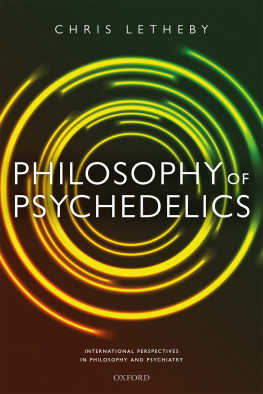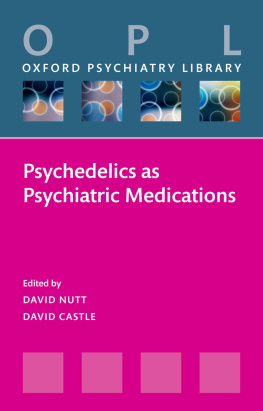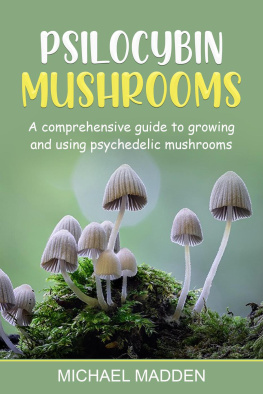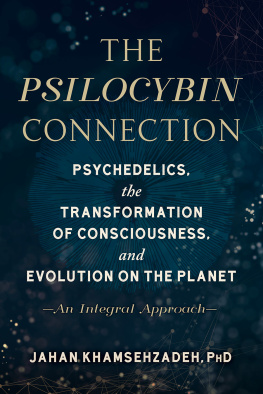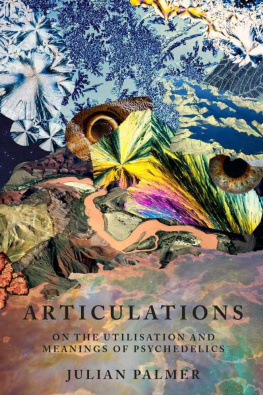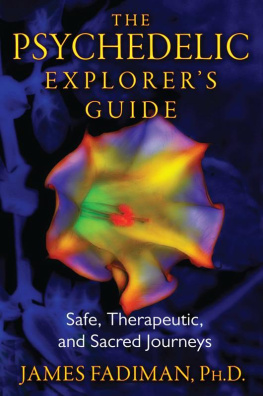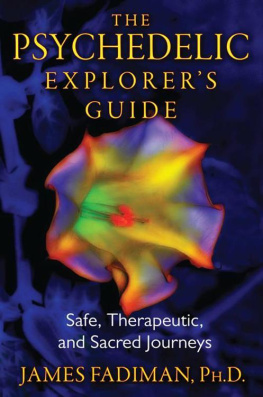Advance praise for Philosophy of Psychedelics
This excellent, well-argued, book is required reading for anyone with interests in philosophy of mind, philosophy of psychology, and philosophy of psychiatry. It presents the first book-length argument for the effectiveness of psychedelic therapy and provides an account of how this effectiveness may be understood from within cognitive neuroscience. Everyone should read this book!
Richard Brown, Humanities Department, LaGuardia Community College, CUNY & M.S. program in Cognitive Neuroscience at the Graduate Center, CUNY
Philosophy of Psychedelics is really two books in one. It provides an easily understood, scholarly and detailed review of psychedelic science, spanning phenomenology, psychology, neuroscience, and medical therapeutics. But setting this book apart from other recent books in this rapidly emerging field of inquiry, Chris Letheby takes his philosopher's scalpel to addressing intriguing philosophical implications of psychedelic research including the unsettling question of whether the claimed benefits from psychedelic experiences require the induction of delusional beliefs. This very readable volume should be of interest to scientists, philosophers, as well as those simply curious about recent the renaissance in psychedelic science and therapeutics.
Roland R. Griffiths, Ph.D. Director, Center for Psychedelic and Consciousness Research, Professor, Departments of Psychiatry and Neuroscience, Johns Hopkins University School of Medicine
Philosophy of Psychedelics is a terrific, intellectually meticulous study of the nature, meaning, and effects of psychedelic experiences. The discussion ranges over the mind-brain relation, transformative experiences, the ethics of psychedelic therapy, and whether psychedelics help us to see the nature of things as they really are or just produce uplifting and therapeutically positive hallucinations. Chris Letheby is a wise and careful guide to the current state of psychedelic therapy and sets very high standards for philosophers who want to follow him in thinking responsibly about this intriguing area of research.
Owen Flanagan is James B. Duke, Professor of Philosophy at Duke University, and the author of *How to Do Things with Emotions* Princeton 2021.
Philosophy of Psychedelics
INTERNATIONAL PERSPECTIVES IN PHILOSOPHY AND PSYCHIATRY
Series editors
Bill (K.W.M.) Fulford, Lisa Bortolotti, Matthew Broome, Katherine Morris, John Z. Sadler, and Giovanni Stanghellini
Volumes in the series:
Recovery of People with Mental Illness: Philosophical and Related Perspectives
Rudnick (ed.)
Values and Psychiatric Diagnosis
Sadler
The Oxford Handbook of Psychiatric Ethics
Sadler, Van Staden, and Fulford
Madness and Modernism: Insanity in the Light of Modern Art, Literature, and Thought
Sass
Disembodied Spirits and Deanimated Bodies: The Psychopathology of Common Sense
Stanghellini
Lost in Dialogue: Anthropology, Psychopathology, and Care
Stanghellini
One Century of Karl Jaspers Psychopathology
Stanghellini and Fuchs
Emotions and Personhood
Stanghellini and Rosfort
Essential Philosophy of Psychiatry
Thornton
The Oxford Handbook of Psychotherapy Ethics
Trachsel (ed.)
Naturalism, Hermeneutics, and Mental Disorder
Varga
The Healing Virtues: Character Ethics in Psychotherapy
Waring
Empirical Ethics in Psychiatry
Widdershoven, McMillan, Hope, and Van der Scheer (eds)
The Sublime Object of Psychiatry: Schizophrenia in Clinical and Cultural Theory
Woods
Alternate Perspectives on Psychiatric Validation: DSM, ICD, RDoC, and Beyond
Zachar, St. Stoyanov, Aragona, and Jablensky (eds)

Great Clarendon Street, Oxford, OX2 6DP,
United Kingdom
Oxford University Press is a department of the University of Oxford. It furthers the Universitys objective of excellence in research, scholarship, and education by publishing worldwide. Oxford is a registered trade mark of Oxford University Press in the UK and in certain other countries
Oxford University Press 2021
The moral rights of the author have been asserted
First Edition Published in 2021
Impression: 1
All rights reserved. No part of this publication may be reproduced, stored in a retrieval system, or transmitted, in any form or by any means, without the prior permission in writing of Oxford University Press, or as expressly permitted by law, by licence or under terms agreed with the appropriate reprographics rights organization. Enquiries concerning reproduction outside the scope of the above should be sent to the Rights Department, Oxford University Press, at the address above
You must not circulate this work in any other form and you must impose this same condition on any acquirer
Published in the United States of America by Oxford University Press
198 Madison Avenue, New York, NY 10016, United States of America
British Library Cataloguing in Publication Data
Data available
Library of Congress Control Number: 2020949256
ISBN 9780198843122
eISBN 9780192581099
DOI: 10.1093/med/9780198843122.001.0001
Oxford University Press makes no representation, express or implied, that the drug dosages in this book are correct. Readers must therefore always check the product information and clinical procedures with the most up-to-date published product information and data sheets provided by the manufacturers and the most recent codes of conduct and safety regulations. The authors and the publishers do not accept responsibility or legal liability for any errors in the text or for the misuse or misapplication of material in this work. Except where otherwise stated, drug dosages and recommendations are for the non-pregnant adult who is not breast-feeding
Links to third party websites are provided by Oxford in good faith and for information only. Oxford disclaims any responsibility for the materials contained in any third party website referenced in this work.
Acknowledgements
My deepest thanks are due to Philip Gerrans, Gerard OBrien, and Jon Opie, without whom this book would not have been written. I am also indebted to Lisa Bortolotti and Thomas Metzinger for timely advice, encouragement, and assistance.
I am extremely grateful to Miri Albahari and Roland Griffiths for their generosity in reading the entire manuscript and providing detailed comments. For reading and commenting on sections of the manuscript, I would like to thank Sam Baron, Sascha Fink, Owen Flanagan, Remco Heesen, Nin Kirkham, Aidan Lyon, Michael Rubin, and Clas Weber. Needless to say, any errors that remain are my responsibility.
Finally, and with apologies to anyone I have forgotten, I would like to thank my stellar editorial team at Oxford University Press: Martin Baum, Janine Fisher, and Charlotte Holloway.
This research was partially supported by the Australian Government through the Australian Research Councils Discovery Projects funding scheme (project DP190101451). The views expressed herein are those of the author and are not necessarily those of the Australian Government or Australian Research Council.
The epigraph at the start of is reproduced from Jane Dunlap, Exploring Inner Space: Personal Experiences under LSD-25, p. 166. Copyright 2003, Harcourt, Brace & World.
The epigraph at the start of Copyright 1978, Springer Nature.

